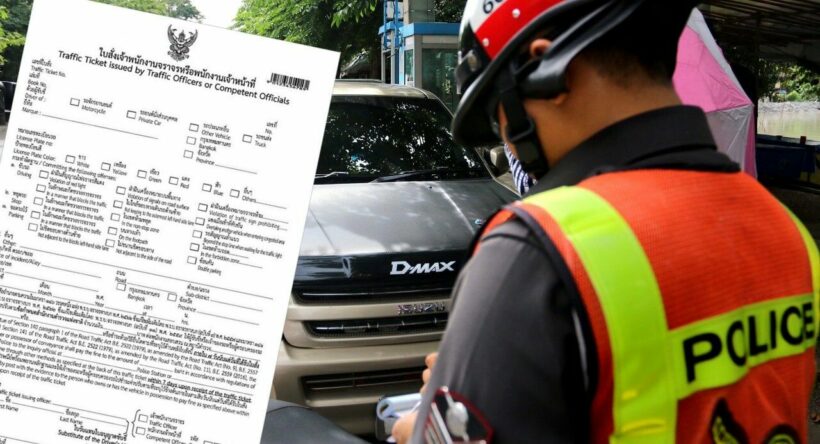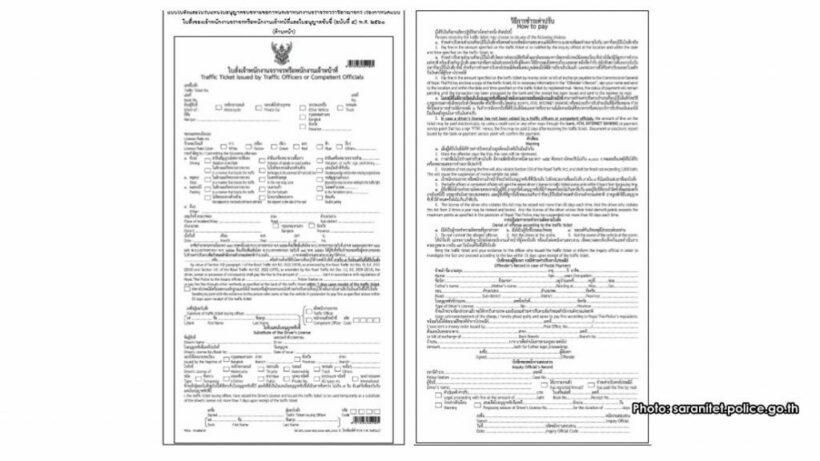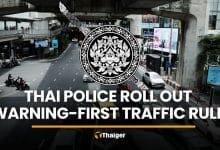RTP urges Thai drivers not to ignore e-tickets, they’re real, not fake

A Royal Thai Police (RTP) spokesperson confirmed e-tickets for traffic violations have been in use since May this year and they are not fake despite claims to the contrary.
Pol Maj Gen Achayon Kraithong announced on Facebook that the RTP e-tickets are real after a well-known neurologist and professor at the Faculty of Medicine, Chulalongkorn University warned motorists of a scam.
Dr Thiravat Hemachudha posted a photocopy of an e-ticket on social media with the message…
“On seeing a ticket like this pasted on your car window, absolutely don’t scan it. It’s a fake.”
The post by Thiravat was brought to the attention of Pol Maj Gen Achayon who investigated the claim. He concluded that the e-ticket was real and issued by Bang Yi Khan police.
Pol Maj Gen Achayon made known to motorists that the RTP has been issuing e-tickets for traffic violations since May, reported Bangkok Post. They are using portable computers loaded with the Police Ticket Management (PTM) application.
Traffic police can print out an e-ticket on a portable computer if they see any traffic law violations, e.g., motorcycle riders not wearing a safety helmet, using a mobile phone while driving and violating traffic signs.
The e-ticket contains all the information on the charge, the fine charge, the date and time of the traffic violation, the location, the vehicle’s registration, the violator’s driving licence, the name of the police officer who issues the ticket and his work unit.
The e-ticket also has a QR code so people can pay the fine via mobile banking and a QR code for them to check the ticket on the website (https:ptm.police.go.th/eticket).
There are currently three types of traffic tickets:
1. The ticket is issued in handwriting.
2. The ticket is sent to the violator by post in case the violation was captured by a device.
3. The e-ticket.
In September, the Cabinet Committee approved a motion under the Traffic Case Draft Act to create a Traffic Law Enforcement Department.
The plan is intended to push drivers in Thailand to be more aware and obedient to the current traffic laws.
The new plan would categorize traffic offences into three different groups, each would be handled differently and whether they received a ticket or a court referral. More serious violations will not go to the new traffic court, but directly to the criminal court, with less serious offences sent directly to court, or receiving a court appointment if they don’t pay a ticket.

GROUP 1
- Violators would be referred to an investigating officer who would set a court appointment for the offender to appear.
- This would apply to those who violate a number of specific offences. Some examples:
- Driving above the speed limit
- Failing to obey traffic lights
- Driving without a driver’s license
- Driving while their driver’s license is suspended, revoked, or expired
GROUP 2
- Violators would be ticketed and fined, but if they refuse to pay the fine, they’ll be given a court appointment instead.
- This would apply to those who violate other offences that fall under the regulations of the Expressway Authority of Thailand, the Highway Act, the Land Transport Act, or the Vehicle Act
GROUP 3
- Violators would fall under standard criminal procedures, with an investigation under the criminal procedure code and referral to the district court depending on the incident.
- This would apply to the most serious violators not covered in the first two groups like reckless driving that endanger people’s lives or drink driving.
Latest Thailand News
Follow The Thaiger on Google News:


























